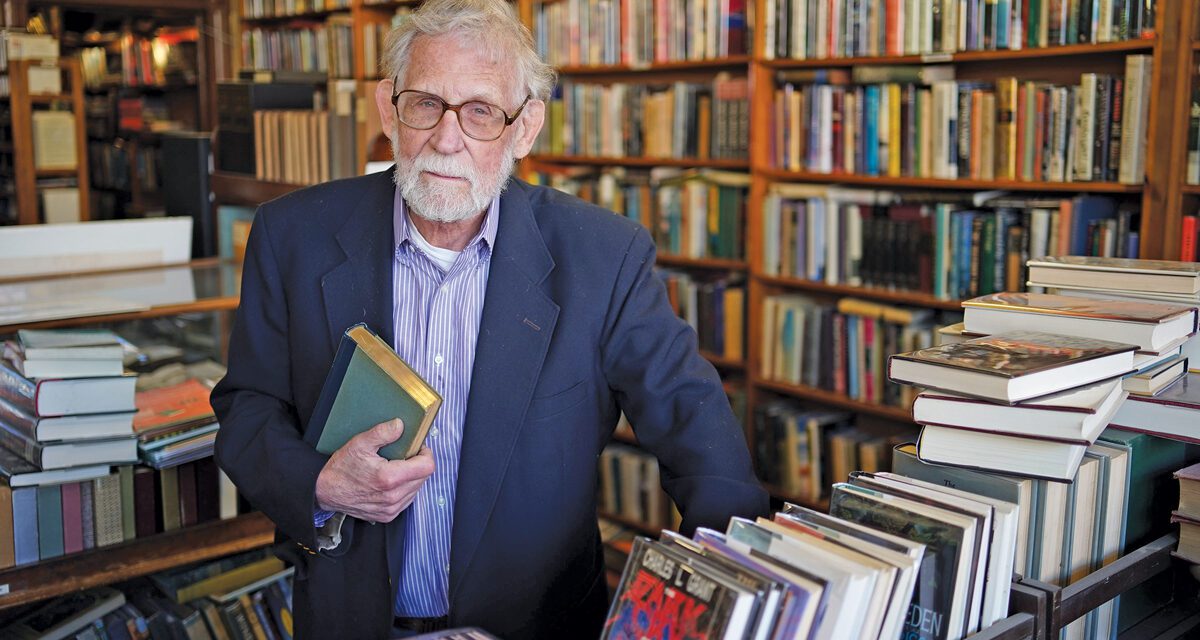Every time Jay Platt walked past the building on his way to work, he thought it would be an ideal location for a bookstore of his own. It was the first block west of Main St. on Liberty and had a classic nineteenth-century storefront with plate glass windows.

Photo: J. Adrian Wylie
It was the summer of 1975, and the building had most recently served as headquarters for the Ann Arbor Sesquicentennial Commission the year before. Downtown was lined with locally owned banks, clothing and department stores, and eateries, but many were struggling under pressure from the brand-new Briarwood Mall.
Platt had a degree from U-M in naval architecture, but had soured on it as a career after an unhappy summer internship prior to his senior year. “Before I got into the book business, I didn’t know what I was going to do,” he says. But then he was “bitten by the book bug” on a visit to New York City’s legendary Book Row, and he started collecting books and working in bookstores.
And though he’d grown up in suburban Virginia, “I always considered myself a Michigander,” Platt says. “I was born in Traverse City [in 1944] when my dad was in the service, and my family has had a summer place in St. Ignace for a hundred years.”
That summer, he was working at David’s Books near campus while he and a partner, Fred Misplon, looked for a place of their own. “He invited me to dinner one night in June or July and said, ‘How’d you like to open up a bookstore?’” Platt recalls. “He put up $3,000, I put up $3,000 worth of books, and we borrowed $3,000 from the bank.”
And one day, as Platt walked by that ideal building, he saw a sign in the window: “Commercial Space for Rent.”
Joe and Carolyn Arcure had just bought the building from the city, which purchased it in 1964 from the family of John Haarer, who erected it in 1888. He used the first floor for a photography studio, then a bookstore and an insurance office. He and his family lived on the top two floors.
The city intended to raze the building for a parking lot, but the Haarers’ two surviving sons, Julius and Oscar, still lived upstairs, and the city agreed that they could stay for the rest of their lives. Though Julius died in 1966 and Oscar in 1967, the parking lot plan never materialized. Instead, the city used it for the sesquicentennial, then sold it.
“I saw that sign and said to myself, ‘there we go,’” Platt remembers. “We signed a lease in August, took a month to build shelves and buy a few more books, and opened on September 21.” Thus was West Side Book Shop born.
“One of the other bookstores in town was Charing Cross, owned by the Borders brothers, which had opened in January,” Platt says. “I used to play poker with them.” Less than three months after his own opening, “Tom and Louis approached me, asking me to consider taking 49 percent of Charing Cross, which would mean closing my store.
“I thought about it for quite a while, then decided nope, I’d rather be my own boss.” He soon bought out Misplon to become sole owner. He’s not the store’s sole occupant, however: Since 1984, Doug Price has sold vintage photographs in a back room that once was John Haarer’s studio.
—
One task in being a dealer is attending book fairs. Platt’s first was “about the first major book fair there was,” he says, sponsored by the Antiquarian Booksellers’ Association of America in April 1976 in New York City. Platt came back and helped form a committee to launch one here.
“The American Library Association was having their rare-book conference in Ann Arbor that year,” he recalls, “and we thought it would be a great idea to get some local dealers together and put on a little book fair for them. It was a three-day event in July 1976, and fourteen dealers, all from Michigan, booked a room in the Michigan League with no air-conditioning.”
A lot of librarians came to the opening reception, perhaps lured by the wine and cheese, and bought next to nothing. “Then we sat for two days looking at each other,” Platt says.
Not surprisingly, they skipped the next year, but tried again in 1978, this time at the Michigan Union. The Ann Arbor Antiquarian Book Fair has been there ever since, missing only 2020 due to the Covid pandemic. Gate receipts benefit the U-M’s Clements Library, which now cosponsors the event.
Sometime in the 1990s, Platt took over its management. “It’s just easier to run it by yourself than by committee,” says the genial, soft-spoken bookman. “And I do get help, of course.”
—
Speaking of help, if not for Platt’s wife, Marilyn Churchill, and his current landlord, Michael Watts, the pandemic might have done in the store. Platt closed his doors for three months, during which his only revenue came from the internet, which accounts for less than 10 percent of his business.
Then Churchill set up a GoFundMe, which raised “around $50,000,” he says. “I was surprised that people I never heard of before donated,” he says. “It makes you feel appreciated.”
As did Watts, who “cut my rent in half,” Platt marvels. “I know a lot of landlords that didn’t give any businesses any breaks. It was a blessing, and it helped tide me over. I’ve been lucky to have landlords who are very supportive of the bookshop.”
The response reinforced his conviction that Ann Arbor is still a book town. “And of course, being a university town, there are a lot of opportunities to buy books and collections.”
He contrasts Ann Arbor with Austin, Texas, where their son Owen lives. He timed one visit so he could do their book fair, but “it was small,” he says. “Here’s a city of about a million people, and it has one used bookstore. And we have four or five, in a city of 120,000.”
When he opened West Side in the building that had just housed the city’s sesquicentennial office, did Platt ever imagine he’d still be there for the bicentennial?
He chuckles, a frequent occurrence. “I didn’t think that far ahead,” he says. “I knew that was what I was going to do. I didn’t have any other plan.”

Go Jay! Go West Side Book Shop! Great photo, and article <3